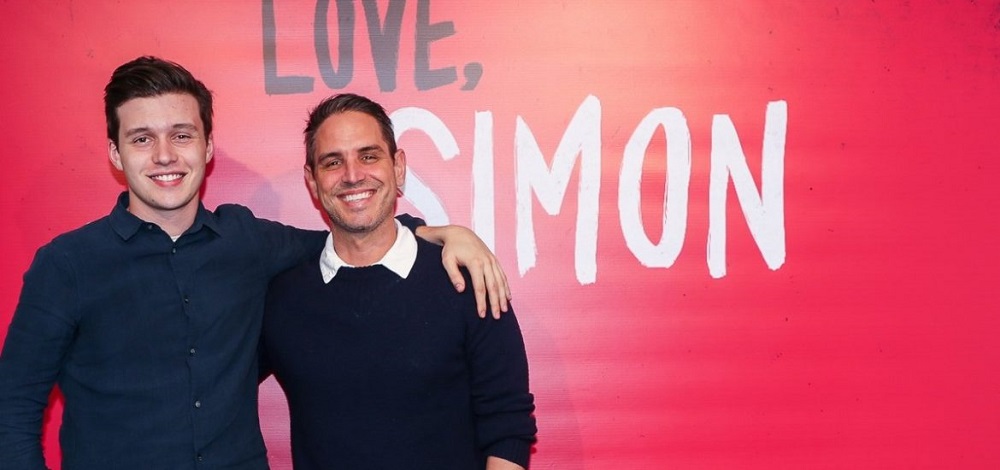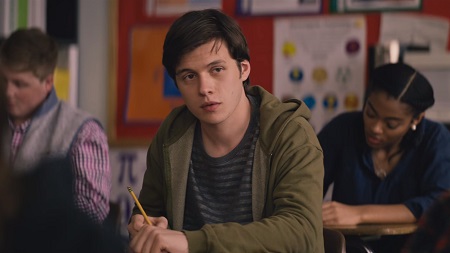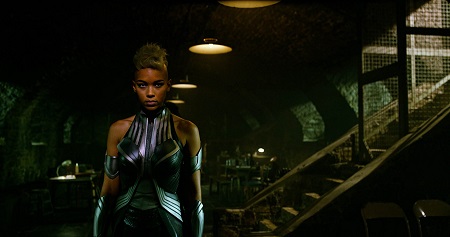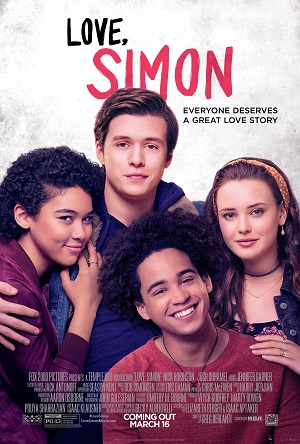
“Love, Simon” – Interview with Greg Berlanti, Nick Robinson & Alexandra Shipp
by Sara Michelle Fetters - March 16th, 2018 - Interviews
Giving it a Think
Director Greg Berlanti and Stars Nick Robinson and Alexandra Shipp on Sharing Love, Simon with the World
Love, Simon is a high school-set tale of friendship, romance and sexuality made for the here and now. Based on the best-selling book Simon vs. the Homo Sapiens Agenda by Becky Albertalli, the movie is the story of Simon Spier (Nick Robinson), a popular 17-year-old kid with loving parents, an adoring sister and friends who would do anything for him. He’s also gay, and he’s fearful of coming out even if he’s relatively positive all who care most about him would be supportive if he did so.
All the same, Simon strikes up an anonymous friendship with a fellow student from his school and in the process thinks he’s falling in love even though he has no idea who this person actually is. During his quest to discover his cybernetic pen pal’s identity, another one of his classmates secretly makes copies of all of the pairs emails and instant messages, threatening to release them to the student body if he doesn’t help him in his own quest to find a girlfriend. Not sure what to do, Simon compromises his friendships in order to keep his secret from going public, in the process learning that if he can’t be honest with himself, he can’t really expect others to be honest with him in return.
Robinson, a Seattle native who made his first notable impression in The Kings of Summer before moving on to be chased by a Tyrannosaurus Rex in Jurassic World, arrived in town for a brief press tour to speak about Love, Simon. He was joined by the film’s director Greg Berlanti (Life as We Know It, The Broken Hearts Club) along with fellow rising star Alexandra Shipp (X-Men: Apocalypse, Tragedy Girls). I had the pleasure to sit down with the three of them in a suite overlooking the city at the top of the newly built Amil Arc apartments. Here are some of the highlights from our brief conversation:
Sara Michelle Fetters: Nick. What’s it like coming home to Seattle bringing a movie like Love, Simon?
Nick Robinson: It’s a cool feeling. I was saying before to someone else, it feels full circle to be coming back home with a film like this. I hope that people will see it. I hope that they’ll go out and see it because I feel like it has really got a message worth taking notice of and sharing with others.
Sara Michelle Fetters: For you, Greg, were you familiar at all with Becky Albertalli’s book before Elizabeth Berger and Isaac Aptaker’s script came your way?
Greg Berlanti: I was. People in my office had read it, really responded to it and tried to option it for us to make, only we ended up losing it to someone else. We lost the bidding. They had sent gifts to the author and everything, but when we didn’t get the rights by then it was off my radar, so I honestly didn’t take the time to read it myself at that moment. But then I got sent the script once the company that did option the book, Temple Hill, along with Fox 2000, had finished a draft. They decided to send it to me. I said to myself, “I guess I should read [Becky’s] book now!” By the halfway point, I’m wondering what’s going to happen next; I’m curious to know what it is these characters are going to do. By the end I was a crying mess. [laughs]
Sara Michelle Fetters: I ask this, because it’s been since 2010 since you stepped behind the camera to direct a feature film, having spent the last few years helping run all of those hit DC Comics television shows like “Arrow” and “Supergirl.” What was it about the material? When did you know you had to be the one to direct this film?
Greg Berlanti: I mean, I think for me directing-wise when it is something I haven’t written, this alarm goes off in me and it gives me a signal as to whether or not I’m the person for the job. For this one, I specifically knew when I finished the script I immediately wished I had had this movie when I was a kid. That’s when I realized I would do anything A) to be a part of it, but B) if I’m not a part of it, to just help them get it made, because it really is the kind of story that I think is just filling a void I didn’t even realize needed to be filled. The script spoke to me.
Sara Michelle Fetters: How about you, Alexandra? Where you familiar with the book?
Alexandra Shipp: The script was my introduction to the material. Once I read the script, even before I got it, I knew that this was something that I wanted to be a part of; the story really moved something in me. When I did read the script, what I loved was the language about the “other.” The language spoke to them, this friend group, all being equal, that this “other” didn’t matter. For me, that was something that I was just like, yes, people need to see that. They need to see that perspective, that whatever I’m doing with my own self has nothing to do with you. That’s important.
Then, I read the book and it just solidified things that much more for me. I was like, this is a movie that’s not only gonna save lives, but it’s gonna change people’s perspective of things that they don’t understand. I think that’s the beauty of filmmaking and in theater and in shows like this, that we’re changing the way people see what’s going on in the world.
Sara Michelle Fetters: What I love about this property is when I said I was going to go see it about a month ago, a fellow film critic friend’s 12-year-old daughter went crazy. She was so insane that I was seeing this before she was. I had no clue that young people of that age were so excited for this story and for this film. What does that say to all of you? From a societal perspective. That not just high school kids but middle school kids, elementary school kids, they are all excited to see your movie.
Nick Robinson: I think it signifies, hopefully, a perspective shift that is happening and that kids are not necessarily growing up seeing things as black and white as previous generations. Actually, Jennifer Garner was talking about this the other day, how her daughters are talking about when they grow up they don’t know if they’ll marry a boy or a girl. They don’t really see a distinction between the two. I think that’s hopefully a good thing. It’s a sign of people growing up being so much more open and aware of the world around them.
Alexandra Shipp: Yeah, I think it’s a social commentative piece when it comes to the evolution of human beings and our ideas of understanding and compassion. I look at these young kids and I just think, “Oh my gosh! You have so much love.”
The amount of judgment that I felt growing up just having a White mom and Black dad, I can’t even imagine what my friends must have gone through, them being their own types of “others.” But kids these days, they just don’t see it that way. It’s so beautiful. It’s such a breath of fresh air and I love that they’re excited about this movie because this movie is for them. It’s for them. Just like Sixteen Candles and all of those movies were for us. This is one of those movies that’s for their generation; that not only speaks to their generation, but also plays into their moral vibration. This is not anything that’s necessarily new to them within society, but it’s definitely new on-screen, and that’s exciting.
Greg Berlanti: I think the best change always comes from kids. It’s nice what you’ve pointed out in the question. What’s so rewarding about it is that they’re not even doing the math in their heads. I would have been. I’ve said this before but, when I was 17, I would have been so afraid of people finding out I was gay that I would have been terrified to go to this sort of movie. I’d have been worried that more people would have thought I was gay or found out my secret. It’s really powerful to hear that kids aren’t thinking about it in those terms. They are just thinking how great this story is. Hopefully, they’re the ones who really spread the word, too. This is more in the hands of teenagers than adults because I think they know it’s for them. Hopefully they’ll spread the word.
Sara Michelle Fetters: While there are obvious issues in this movie that I’m sure you want people to think about and discuss after they watch it, at the film’s core, though, is a story of friendship.
Alexandra Shipp: Very much so. It’s the most important element in my opinion.
Sara Michelle Fetters: What was it like for all of you as a cast to develop that easygoing naturalistic camaraderie? And not just for you two, Nick and Alexandra, but with your primary co-stars Katherine Langford, Logan Miller and Jorge Lendeborg Jr. as well.
Alexandra Shipp: Well, Nick and Logan were already friends, so they had a head start on the rest of us. [laughs]
Nick Robinson: Only a little one. You fit in pretty quick. [laughs]
Alexandra Shipp: You all made it pretty easy. That helped. [laughs]
Honestly, though, it’s all because of Greg. What’s awesome about Greg is that he got us all together for rehearsals, and then after those rehearsals he would have us all hang out doing what we all do. And so a lot of the friendship that you see on the screen was friendship that we had created in our own lives. Whether it’s inside jokes that made it into the movie, or like little things here and there that really brought us really close together, it was all pretty magical. I mean, we still hang out. All these months later we still hang out. I think that we will all be friends for life.
Nick Robinson: BFF’s.
Alexandra Shipp: Definitely. BFF’s. And I really hope so. I truly do. That would be really nice. These people to me, the mean so very much! When you work on a movie like this, the amount of love and integrity that goes into it to make it work, I don’t think that I’ll never not have these people in my lives because of what we went through.
Nick Robinson: I would agree with all of that. I think everyone came in with a fantastic attitude. They were all onboard pretty much from day one. The rehearsals really helped, too. They got us all onto more stable ground in terms of flushing out the relationships. I think what you’re seeing on the screen is not totally make believe up there. There’s a fair amount of realism.
Sara Michelle Fetters: Speaking of make believe, how hard is it to transition between smaller pictures like this one and the more gigantic ones, where it is all make believe and most of the time when you’re on the set you’re acting against things that are physically not there. Nick, you’re not really running from a Tyrannosaur. Alexandra, you’re not really battling Magneto in a sphere of crushed iron and rubble.
Nick Robinson: I think it’s very lucky that we get to do that. To be able to have both experiences. They’re both fun in their own way. The more human story, the more intimate story, it can ultimately be more satisfying. But they’re both fun. They’re both challenging. You are pretending for a living. That’s pretty fun.
Alexandra Shipp: I think about it like food, because I do love food.
Nick Robinson: You’re getting your cake and eating it to? [laughs]
Alexandra Shipp: Don’t you finish my sentences. I can explain my own metaphors, thank you. [laughs]
Nick Robinson: Suddenly I’m very interested. And hungry. I’m now very hungry.
Alexandra Shipp: Shush! [laughs]
But, back to what I was saying. I like to think about it like food. . These big studio films, movies like X-Men. That’s like a fancy five-course meal. That’s like truffle everything. You know what I mean?
Greg Berlanti: Very expensive.
Alexandra Shipp: Very, very expensive. A little over the top, even.
This movie, this movie is like a home-cooked meal. Both of them are delicious. Both of them are special. The comparison for me, though, is that while they both feel good, while they both taste good, one means that much more because someone you loved prepared that meal for you.
I love playing Storm. Playing Storm is so much fun. To get to play a superhero is amazing. But to do a movie like this means just that much more. I’m not gonna change the way people think with X-Men. But with something like Love, Simon? I really get to be that much closer to maybe doing just that. I really get to put more of my heart and soul spin on it. That is really exciting for me, because even though I love eating out, and I eat out almost every night, a home-cooked meal is the best thing I could have. Love, Simon is that home-cooked meal.
Sara Michelle Fetters: I have to wrap things up so I leave you all with this question: At the end of the day, what do you hope people are talking about as they exit the theatre after watching your movie?
Greg Berlanti: These two have heard me say a version of this before but, for me, the movies of this brand that really moved me, especially when they were about young people, or when I was young when I saw them, they’ve stayed with me forever. I think that’s the thing. If you mark part of your life by them, by these films, and they remind you of a pivotal moment in your life, then they become a part of your own biography. You carry them with you. I think that’s always my hope for something like this.
Nick Robinson: I’ve said an answer similar to this as well, but I hope the people walk away feeling like they were included and were a part of something. That their perspective, hopefully, has changed or that they’ve gained some new insight that they may not have had before. I think that is one of the strengths of this film, and it’s what makes it a little subversive, too. The film is mainstream and it’s kind of pop. It’s something you’ve seen before. But it’s also told from a perspective that you haven’t maybe seen or listened to before. It’s a little alternative. A little rock ‘n’ roll. I hope that people walk away trying to figure out what exactly was different. Hopefully, it’s obvious for them. I hope that they take into account this new perspective and feel. That they give it a think, you know? You give it a think.
Alexandra Shipp: “Give it a think.” I like that.
Nick Robinson: Just use the old noodle. Let people feel like they were included and that they were heard.
Alexandra Shipp: I want to create allies. Yes. I want to create allies with this movie. I want people to see this movie, see how the “other” is treated in this movie and to not allow something like that to happen in front of them. I really want to create soldiers for social injustice. For those moments when someone’s getting hurt or bullied or just treated wrong, I want someone to stand up and actually do something about it. I think that kids are headed that way. I think a movie like this really allows you to see that, even though that a person is weird or a nerd or a geek or a freak or a little bit different or whatever else you can think of, they’re still human. No one deserves to be treated like they are not human. No one.
– Interview reprinted courtesy of the SGN in Seattle







